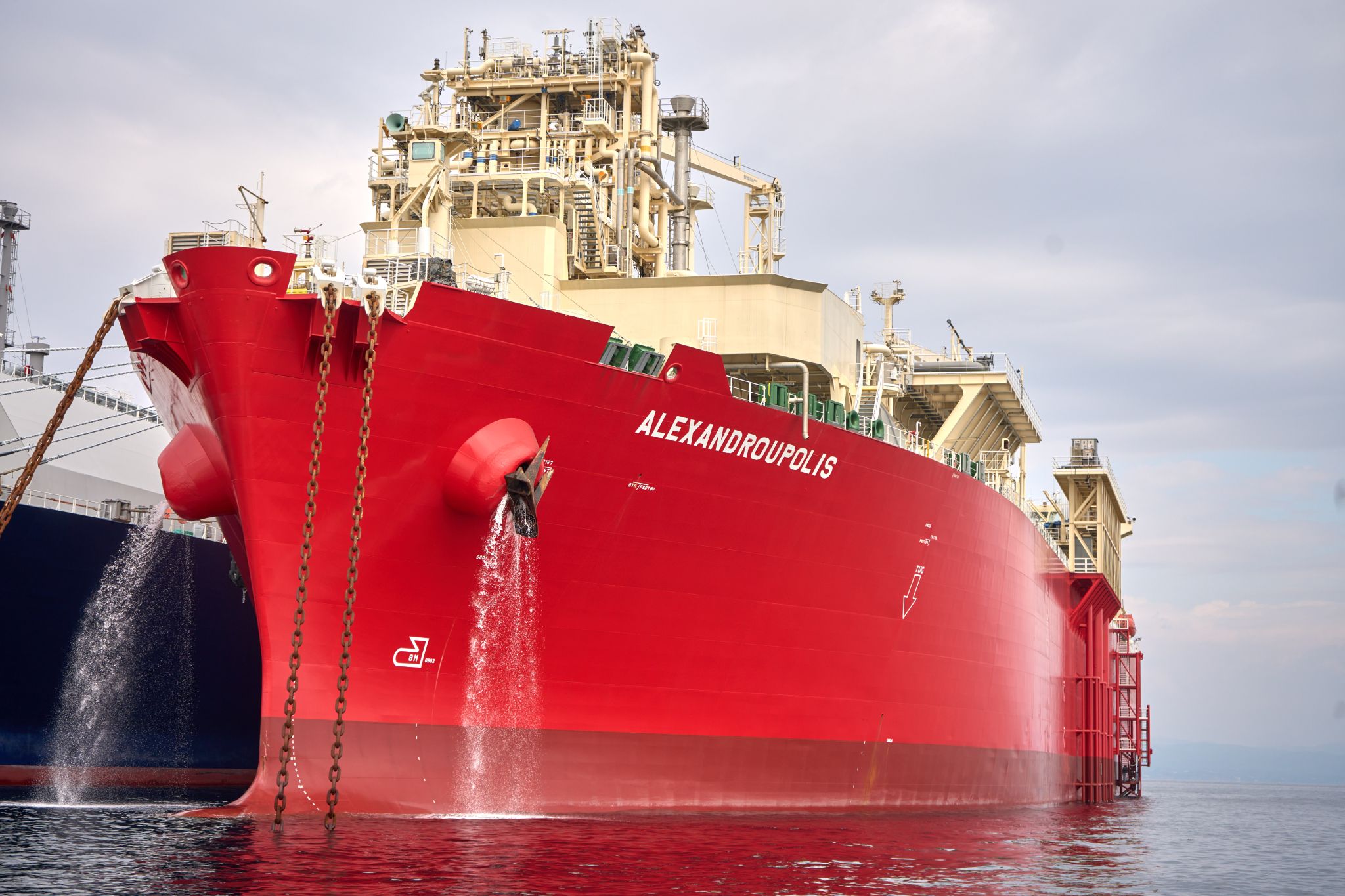Greece is poised to become a pivotal “LNG corridor” under a deepening US-Greece partnership. Washington views Greece not just as a buyer but as a strategic partner, channelling new LNG flows to Europe to gradually replace Russian gas.
In recent months, this major energy shift has been accompanied by heightened activity in Athens. High-level US officials have been meeting with the Greek government and leading Greek energy entrepreneurs, with American liquefied natural gas (LNG) at the center of discussions.
Washington’s ambition is to flood Europe and Greece with American LNG. This was reinforced during Interior Secretary Doug Burgum’s recent visit to Athens. Burgum recently visited Athens to assess infrastructure readiness and Greece’s commitment to facilitating US LNG transit to Europe.
The momentum builds ahead of the Partnership for Transatlantic Energy Cooperation (P-TEC) conference, set for November 6-7 in Athens.
Its composition in itself is indicative of the US’ strategic plan. The US Secretary of Energy, Chris Wright, the US Secretary of the Interior and Head of the National Energy Dominance Council, Doug Burgum, and the Deputy Secretary of State for Management and Resources, Michael J. Rigas, have arrived yesterday in Athens to participate in a meeting of the Partnership for Transatlantic Energy Cooperation (P-TEC), which is hosted by Greek Energy Minister Stavros Papastavrou.
The conference will also be attended by energy ministers from 25 countries on both sides of the Atlantic and over 400 senior officials.
The Greek prime minister Kyriakos Mitsotakis highlighted on Wednesday Greece’s crucial role in energy cooperation with the United States during a meeting at the Maximos Mansion with U.S. Secretary of the Interior Doug Burgum and U.S. Secretary of Energy Chris Wright.
The discussion confirmed the strategic nature of Greek-American relations and the deepening energy partnership ahead of the Partnership for Transatlantic Energy Cooperation (P-TEC) conference.
The meeting underscored the mutual commitment to strengthening this cooperation and its significance for the energy security of Central and Eastern Europe.
Mitsotakis emphasized Greece’s key role in the development of the Vertical Corridor and the country’s energy infrastructure, including the Revithoussa and Alexandroupolis LNG terminals, which together transform Greece into a major regional hub for liquefied natural gas, extending energy access as far as Moldova and Ukraine.
The prime minister also underlined the strategic importance of the Greek shipping industry in LNG transportation, noting that the simultaneous presence of ExxonMobil and Chevron in Greece represents a “clear American vote of confidence.”
“It’s also very encouraging that American energy companies are already active in Greece. I understand that important announcements are expected tomorrow – including the first exploratory drilling operations in decades,” he said.
The presence at this year’s event of the US Secretaries of Energy and Interior, Chris Wright and Doug Burgum, places Greece squarely inside the core of the “LNG energy corridor.”
“Our country will be at the epicentre of global energy developments. Our goals from P-TEC are twofold,” the Greek energy minister Stavros Papastavrou emphasized.
“First, to secure and further strengthen our country’s geostrategic position as the entry point into Europe of American LNG and, second, to conclude important trade agreements that will bring profit to our country. And we are optimistic that there will be such agreements for energy,” he said.
At the same time, Papastavrou referred to the significant impact on all European states from the price of natural gas imported from abroad. “Our country was obliged – and the government is doing so – within the framework of our energy independence, to develop and exploit the hydrocarbon sector.
“Neighbouring countries such as Israel, Lebanon, Türkiye, Cyprus, Albania, have all done so apart from Greece, due to obsessions for so many years. Now it is being done, the Ministerial Decisions have been signed, which define the joint ventures of the Chevron – Helleniq Energy groups as preferred investors. Before the end of the year, we will take the contracts to the Court of Audit and then to Parliament. We are making haste, to secure the future of our country,” he said.
The APOLLOCO2 Project in Greece
The APOLLOCO2 project in Greece, initiated and led by ECOLOG and DESFA has secured a grant of €169.3m from the EU Innovation Fund.
According to ECOLOG, this critical funding will enable the construction of a floating liquefaction and storage unit with a liquefaction capacity of 3mtpa expandable to 5mtpa.
The facility will also benefit from cold energy produced via heat exchangers for the liquefaction of CO2, due to its co-location with the neighbouring LNG import terminal on Revithoussa Island. This terminal will support large and small emitters undertaking carbon capture to decarbonise their businesses in Southern Greece.
This is an important step for Greece and its ambitions to decarbonise heavy industry and maintain jobs, according to ECOLOG.
To remind, ECOLOG is a mid-stream CO2 services company dedicated to net zero and supporting urgent action on climate change.
US LNG Leads the Greek Market
Regarding imports, LNG’s role was significantly strengthened, covering over 40% of total gas imports compared to approx. 26% in the first nine months of 2024, with Agia Triada (Revithoussa) being the key entry point and Amphitrite (FSRU Alexandroupolis) following.
Despite the fact the Revithoussa remained offline for scheduled maintenance works between 22/5-11/5, the Terminal covered 39% of the country’s total gas imports, receiving 36 LNG carriers, more than double compared to 17 carriers during the same period of 2024.
The volumes unloaded amounted to 22.41 TWh, increased by 81.60% compared to 12.34 TWh in 2024. Through Amphitrite (the Alexandroupolis FSRU), a total of 1.03 TWh of LNG was imported until 22/1 when regasification services at the Station became temporarily unavailable.
The United States of America was the main LNG supplier, with volumes reaching 19.62 TWh (88% of the total), compared to 8.02 TWh last year.
It was followed by Nigeria with 1.37 TWh, Norway with 0.93 TWh, and Algeria with 0.49 TWh.
Energy Dominates Meeting Between Greek PM and US Ambassador to Greece
Energy cooperation between Greece and the U.S. was the central focus of the discussion between Greek prime minister Kyriakos Mitsotakis and the new American Ambassador to Greece Kimberly Guilfoyle during their first meeting at the Maximos Mansion on Wednesday.
The prime minister Mitsotakis offered a warm welcome and highlighted the current state of energy relations, among other topics:
“This is a historic week. We have not only myself arriving, the P-TEC conference, wonderful bilateral meetings with all of your ministers and yourself. But incredible things planned for this conference, for Greece to be the energy hub here in the Eastern Mediterranean, up through the Vertical Corridor. We have representatives and ministers from all different countries coming, Romania, Hungary, Bulgaria – It’s very exciting-, Cyprus, Ukraine, a historic 3+1 meeting that will be taking place as well.
“And a record setting, 80 plus United States government officials have all descended upon Greece and Athens for this P-TEC conference, and that is a record for Greece and for the United States.
“And also we have Secretary Burgum, Secretary of the Interior returning for the second time in just a matter of months to come back to attend this conference, which will be the second time the Secretary of the Interior has ever visited Greece. The first time was his first arrival. Secretary Wright, Energy Secretary coming.
“We have the Under Secretary of energy dominance here as well, he arrived last night. So there’s a lot of enthusiasm. Our Deputy Secretary of State, Mike Rigas of Greek origin. We have them all here in town.
“They’re all excited to see you and be a part of really political and economic history, advancing trade and commerce issues, and also energy dominance, which will equate to energy dominance being national security, sovereignty and border.”
I had a fantastic first meeting with @PrimeMinisterGR Kyriakos Mitsotakis today. Under @POTUS's leadership, America is focused on results – building alliances that strengthen our security, expand opportunity, and promote prosperity. Greece is a country that leads with courage… pic.twitter.com/olig87pgkK
— Ambassador Kimberly Guilfoyle (@USAmbassadorGR) November 5, 2025



